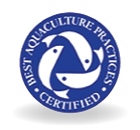
East Coast salmon farm gets certified
By Food in Canada staff
Business Operations Food Safety Food TrendsNorthern Harvests’ efforts to run a sustainable and responsible salmon farm pay off
Letang, Nfld. – One of Canada’s largest aquaculture companies has received the Best Aquaculture Practices (BAP) Certification.
Northern Harvest Sea Farms received the certification from the Global Aquaculture Alliance (GAA), an international, non-profit trade association. For Eastern Canada, this is the first BAP-certified salmon farm.
The certification specifically went to Northern Harvest’s Bar Island site in New Brunswick, where the company also has operations.
Northern Harvest
Northern Harvest also operates a HACCP-certified processing plant in St. George. Its new state-of-the-art salmon hatchery will be one of the largest in the world. The FishSite.com reports that the company’s strategy is to deliver fresh, sustainably grown salmon with the smallest possible carbon footprint, as quickly and efficiently as possible.
The company, which was established in 1985, has more than 250 employees. In 2007, the company opened a processing plant in St. George, N.B., offering a full range of products including fillets, steaks and portions. In addition to Atlantic salmon, the company processes trout, char and halibut.
The company says its farmed salmon are:
• High in Omega 3
• Fed a quality diet that provides optimal colour and flavour, high in vitamins C and E
• Reared at low stocking densities to provide a healthier and better quality product
• Harvested in a gentle manner designed to prevent soft flesh and gaping
• Graded to ensure consistency in quality
• Reared in a hands-on manner in every aspect of the growth cycle
Global Aquaculture Alliance
 GAA, which was organized in 1997, develops the Best Aquaculture Practices certification standards and encourages the use of responsible aquaculture practices. GAA also works to improve production and marketing efficiencies, and promote effective, coordinated regulatory and trade policies.
GAA, which was organized in 1997, develops the Best Aquaculture Practices certification standards and encourages the use of responsible aquaculture practices. GAA also works to improve production and marketing efficiencies, and promote effective, coordinated regulatory and trade policies.
BAP standards address environmental and social responsibility, animal welfare, food safety and traceability in a voluntary certification program for aquaculture facilities.
BAP certification defines the most important elements of responsible aquaculture and provides quantitative guidelines by which to evaluate adherence to those practices.
The BAP program outlines standards for each type of facility, from hatchery and feed mill to farm to processing plant. It currently certifies shrimp farms and hatcheries; salmon, tilapia, channel catfish and Pangasius farms; seafood processing plants and feed mills.
Print this page